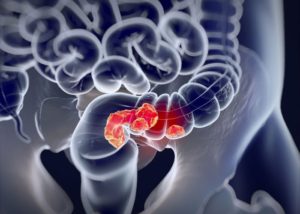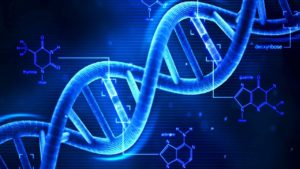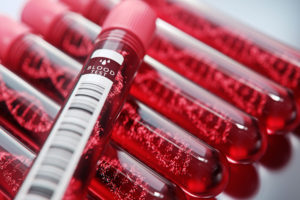Bay Biosciences high quality clinical grade fresh frozen fresh frozen tumor tissue samples with matching serum, plasma, peripheral blood mononuclear cells (PBMC) biofluid samples derived from patient’s whole blood from unique cancer patients diagnosed with advanced stage colorectal cancer (CRC).

Colorectal Cancer Overview
Colorectal cancer (CRC), also known as bowel cancer, colon cancer, or rectal cancer, is type of cancer that starts from the colon or rectum (parts of the large intestine). Colon cancer is a type of cancer that begins in the large intestine (colon). The colon is the final part of the digestive tract. Colon cancer typically affects older adults, though it can happen at any age. It usually begins as small, noncancerous (benign) clumps of cells called polyps that form on the inside of the colon. Over time some of these polyps can become colon cancers.
Signs and symptoms may include blood in the patients stool, a change in the bowel movements, fatigue all the time, weight loss etc.
Most colorectal cancers are due to old age and lifestyle factors, with only a small number of cases due to genetic disorders. Other risk factors include diet, obesity, smoking and lack of physical activity. Dietary factors that increase the risk include consumption of red meat, processed meat, processed foods and alcohol.
Colorectal Cancer Signs and Symptoms
Patients with colorectal cancer may experience the following signs and symptoms:
- A change in bowel habits
- Diarrhea, constipation, or a feeling that the bowel does not empty completely
- Fever
- Bright red or very dark blood in the stool
- Stools that look narrower or thinner than normal
- Abdominal pain or discomfort in the abdomen, including frequent gas pains, bloating, fullness, and cramps
- Nausea
- Weight loss with no known explanation
- Fatigue or feeling constant tiredness
- Unexplained iron-deficiency anemia (low levels of RBCs)
Colorectal Cancer Causes
Genetics

There are several factors that can increase an individuals risk of developing colorectal cancer. Following are some of the known factors for developing colorectal cancer:
Changes in the DNA sequence are called genetic variants. The majority of the time genetic variants have no effect at all, but, sometimes, the effect is harmful, in case just one letter missing or changed may result in a damaged protein, extra protein, or no protein at all, with serious consequences for our health. Cancer is caused by changes in the DNA inside our cells. DNA is the chemical in our cells that makes up our genes, which control how our cells function. We usually look like our parents because they are the source of our DNA. But DNA affects more than just how we look.
Some genes help control when our cells grow, divide into new cells, and die:
- Certain genes that help cells grow, divide, and stay alive are called Oncogenes.
- Genes that help keep cell division under control or cause cells to die at the right time are called tumor suppressor genes.
Cancers can be caused by DNA mutations (changes) that turn on oncogenes or turn off tumor suppressor genes, which leads to cells growing out of control. Changes in many different genes are usually needed to cause colorectal cancer.
Hereditary Gene Mutations
Certain DNA mutations can be passed on in families and are found in all of a person’s cells. These are called inherited disorders or inherited mutations. A very small portion of colorectal cancers are caused by inherited gene mutations. Following are the known DNA changes and their effects on the growth of cells:
- Familial adenomatous polyposis (FAP), attenuated FAP (AFAP), and Gardner syndrome are caused by inherited disorder or changes in the adenomatous polyposis coli or APC gene. The APC gene is a tumor suppressor gene, which normally helps keep cell growth in check. In people with inherited changes in the APC gene, this brake on cell growth is turned off, causing hundreds of polyps to form in the colon. Over time, cancer will nearly always develop in one or more of these polyps.
- Lynch syndrome (hereditary non-polyposis colon cancer, or HNPCC) is caused by changes in genes that normally help a cell repair damaged DNA. A mutation in one of the DNA repair genes like MLH1, MSH2, MSH6, PMS2, and EPCAM, can allow DNA errors to go unfixed. These errors will sometimes affect growth-regulating genes, which may lead to the development of cancer.
- Peutz-Jeghers syndrome is caused by inherited changes in the STK11 (LKB1) gene, a tumor suppressor gene.
- MUTYH-associated polyposis (MAP) is caused by mutations in the MUTYH gene, which is involved in how the cell proofreads or checks the DNA and fixes errors when cells divide.
Acquired Gene Mutations
Most gene mutations that lead to cancer are acquired mutations. They happen during a person’s lifetime and are not passed on to their children. These DNA changes affect only cells that come from the original mutated cell. In most cases of colorectal cancer, the DNA mutations that lead to cancer are acquired during a person’s life rather than having been inherited. Certain risk factors may play a role in causing these acquired mutations, but so far it’s not known what causes most of them.
There is not a single genetic pathway to colorectal cancer that’s the same in all cases. In many cases, the first mutation occurs in the APC gene. This leads to an increased growth of colorectal cells because of the loss of this brake on the cell growth. Further mutations may then occur in other genes, which can lead the cells to grow and spread uncontrollably. Other genes that are not known as yet could probably involved as well.
Colorectal Cancer Risk Factors
A risk factor is anything that increases a person’s chance of developing cancer, following are some of the factors that may raise a person’s risk of developing colorectal cancer:
- Age: The risk of colorectal cancer increases as people get older.
- Familial History of colorectal cancer: Colorectal cancer may run in the family if first-degree relatives (parents, brothers, sisters, children) or many other family members (grandparents, aunts, uncles, nieces, nephews, grandchildren, cousins) have had colorectal cancer.
- Rare inherited diseases: Family Members who have certain uncommon inherited conditions also have a higher risk of colorectal cancer.
- Inflammatory Bowel Disease: Patients who have IBD, such as Ulcerative Colitis or Crohn’s disease, may develop chronic inflammation of the colon, which increases the risk of developing colorectal cancer.
- Adenomatous polyps (adenomas): Some types of polyps called adenomas can develop into colorectal cancer over time
- Personal history of certain types of cancer: Women who have had ovarian cancer or uterine cancer are at higher risk of developing colorectal cancer.
- Race: In the United Sates African Americans have the highest rates of sporadic, or non-hereditary, colorectal cancer.
- Physical inactivity and obesity: People who live inactive lifestyle, don’t exercise and lead to obesity may have an increased risk of colorectal cancer.
- Excessive alcohol drinking: High alcohol consumption leads to higher risk of developing colorectal cancer.
- Smoking: Smoking is one of the major causes of all types of cancers.
- Diet: Research links eating more red meat and processed meat increases the risk of developing colorectal cancer.
Colorectal Cancer Diagnosis
For most types of cancer, usually a biopsy is the confirmed and best way to know whether an area or a part of the body has cancer. In addition to a physical examination following are the common diagnostics tests used to diagnose colorectal cancer:
- Colonoscopy
- Biopsy to detect tumor
- Blood tests, CBC
- Molecular testing of the tumor
- Computed tomography (CT scan)
- Magnetic resonance imaging (MRI)
- Positron emission tomography (PET scan)
- Ultrasound
- Chest x-ray

Bay Biosciences is a global leader in providing researchers with high quality, clinical grade, fully characterized human tissue samples, bio-specimens and human bio-fluid collections from cancer (tumor) tissue, cancer–serum, cancer–plasma cancer-PBMC and human tissue samples from most other therapeutic areas and diseases.
Bay Biosciences maintains and manages it’s own bio-repository, human tissue bank (biobank) consisting of thousands of diseased samples (specimens) and from normal healthy donors available in all formats and types. Our biobank procures and stores fully consented, deidentified and institutional review boards (IRB) approved human tissue samples and matched controls.
All our human human tissue collections, human specimens and human bio-fluids are provided with detailed samples associated patient’s clinical data. This critical patient’s clinical data includes information relating to their past and current disease, treatment history, lifestyle choices, biomarkers and genetic information. Patient’s data is extremely valuable for researchers and is used to help identify new effective treatments (drug discovery & development) in oncology, other therapeutic areas and diseases. This clinical information is critical to demonstrate their impact, monitor the safety of medicines, testing & diagnostics, and generate new knowledge about the causes of disease and illness.
Bay Biosciences banks wide variety of human tissue samples and biological samples including cryogenically preserved -80°C, fresh, fresh frozen tissue samples, tumor tissue samples, FFPE’s, tissue slides, with matching human bio-fluids, whole blood and blood derived products such as serum, plasma and PBMC’s.
Bay Biosciences is a global leader in collecting and providing human tissue samples according to the researchers specified requirements and customized, tailor made collection protocols. Please contact us anytime to discuss your special research projects and customized human tissue sample requirements.
Bay Biosciences provides human tissue samples (human specimens) from diseased and normal healthy donors; including peripheral whole-blood, amniotic fluid, bronchoalveolar lavage fluid (BAL), sputum, pleural effusion, cerebrospinal fluid (CSF), serum (sera), plasma, peripheral blood mononuclear cells (PBMC’s), saliva, Buffy coat, urine, stool samples, aqueous humor, vitreous humor, kidney stones, renal calculi, nephrolithiasis, urolithiasis and other bodily fluids from most diseases including cancer. We can also procure most human bio-specimens and can do special collections and requests of human samples that are difficult to find. All our human tissue samples are procured through IRB approved clinical protocols and procedures.
In addition to the standard processing protocols Bay Biosciences can also provide human plasma, serum, PBMC bio-fluid samples using custom processing protocols, you can buy donor specific sample collections in higher volumes and specified sample aliquoting from us. Bay Biosciences also provides human samples from normal healthy donors, volunteers, for controls and clinical research, contact us Now.
日本のお客様は、ベイバイオサイエンスジャパンBay Biosciences Japanまたはhttp://baybiosciences-jp.com/contact/までご連絡ください。
